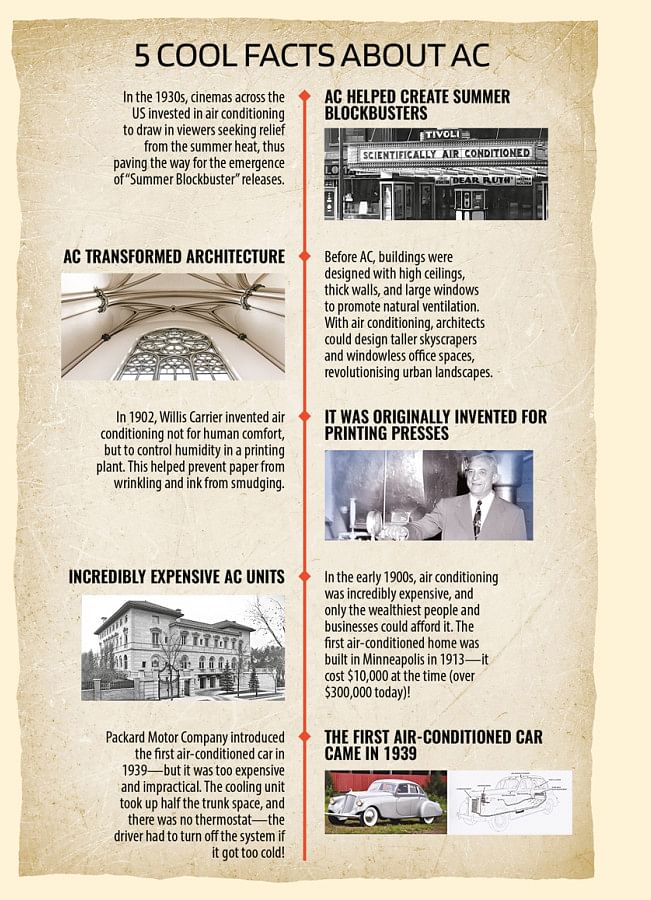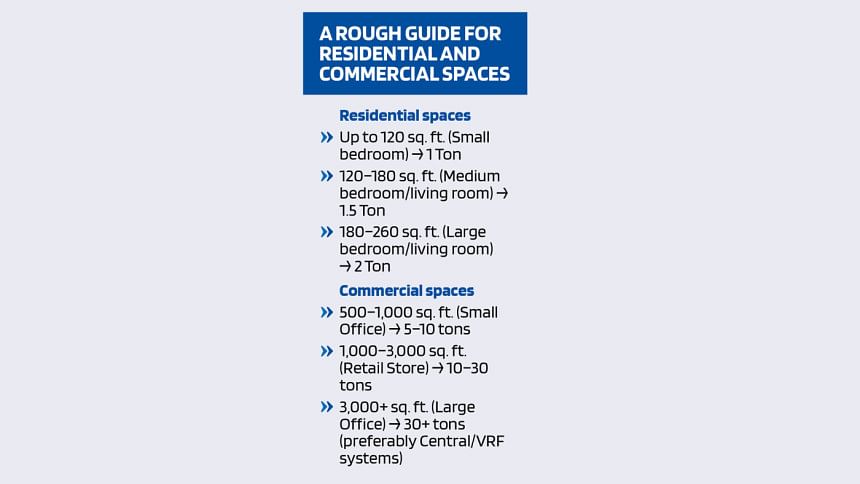How to pick the perfect AC for your space?

When the Bangladeshi summer hits full swing, it doesn't just raise temperatures—it tests your patience, sleep, and sanity. In this sweltering heat, an air conditioner isn't a luxury—it's a lifeline. Whether you're buying your first AC or upgrading to a smarter model, choosing the right unit is a long-term decision. Thankfully, Bangladesh's electronics market is booming, offering energy-efficient, feature-packed options. With the right knowledge, you can turn this blazing summer into a season of comfort and smart choices.
Residential space
When buying an air conditioner for residential use, one of the most important factors to consider is capacity, measured in tons or British Thermal Units (BTUs).
A general rule of thumb: 1 ton (12,000 BTU) is suitable for around 120 sq. ft. However, room size isn't the only factor. Sunlight exposure, ceiling height, insulation, number of occupants, and even proximity to the kitchen all impact cooling efficiency.
Ariful Islam, Deputy Executive Director and Head of Research and Innovation for Residential Air Conditioners at Walton, has emphasised the importance of checking the specifications beforehand, stating, "You must ensure you're choosing the right AC for your home, as selecting the appropriate BTU capacity is essential for both performance and cost-effectiveness."
For larger homes or open-plan areas, consider multiple units or a high-capacity inverter AC. An undersized AC will struggle to cool efficiently, while an oversized one will waste energy by cycling too quickly. The right capacity ensures balanced cooling, lower maintenance, and better energy efficiency for long-term comfort.

Commercial space
For business owners in Bangladesh, air conditioning is a necessity that impacts both productivity and customer satisfaction. However, high electricity bills can be a major concern, making it crucial to select the right AC system for your commercial space.
Like residential areas, factors such as square footage, number of windows and doors, local climate, and occupancy levels all play a role in determining the ideal cooling solution.
Smaller shops and offices (under 1,000 sq. ft.) should opt for 2–3-ton units from cost-effective brands, while larger spaces (over 1,000 sq. ft.) benefit from high-performance commercial systems suited for large offices or boutiques.
For large commercial spaces, central air conditioning is ideal, distributing cooled air through ducts. For smaller commercial spaces, ductless systems offer flexibility by cooling specific areas independently.
FEATURES THAT TRULY MATTER
Modern air conditioners come loaded with features, from Wi-Fi remote start to precision sensors detecting room hotspots. Here are the key factors to consider.

Window vs split
While split ACs dominate today, window ACs were once popular. Choosing between them depends on installation, design, cooling capacity, and aesthetics. Window units suit single rooms, while split ACs offer greater capacity for larger spaces.
Energy efficiency
Unlike traditional ACs that turn on and off repeatedly, inverter ACs adjust their speed seamlessly to maintain a steady temperature.
"Inverter ACs sip electricity. Unlike their non-inverter counterparts, they don't gulp power in one go. Instead, they gracefully modulate their cooling capacity based on your room's needs," says Md Julhak Hossain, National Sales Manager, Electromart Ltd. This reduces carbon footprints and lowers electricity bills.
Additionally, two key efficiency indicators to consider are COP (Coefficient of Performance) for heating and EER (Energy Efficiency Ratio) for cooling. It is imperative to note that the higher the COP or EER, the more efficient and energy-saving the AC tends to be.
For commercial spaces, opting for an AC unit with a high Seasonal Energy Efficiency Ratio (SEER) ensures maximum efficiency, meaning the AC uses less energy to provide the same amount of cooling compared to units with lower SEER ratings.
While energy-efficient models may have a higher upfront cost, they reduce electricity bills in the long run—making them a smart decision. Look for Energy Star-certified units to ensure optimal energy savings and environmental benefits.
A wealth of smart features
Innovative features include a sleek digital display, offline voice control in both Bangla and English, Bluetooth-enabled operation, air filters, noise reduction systems, and an AI Doctor system that improves air quality by killing bacteria and controlling humidity levels, while also providing maintenance alerts.
"The Jamuna Smart Inverter AC includes a PM 2.5 filter that uses high-pressure ionisation and nano cold catalyst dust-collecting technology to eliminate even the tiniest airborne particles, ensuring cleaner indoor air. Its Cold Plasma Technology enhances air ionisation, reducing mental fatigue, preventing infections, and boosting vitality," says Monika Islam, Group Director, Jamuna Group.
Other essential factors include cooling speed, noise levels, gas type, spare parts availability, and Coatec Technology, which enhances durability by protecting against rust and corrosion, ensuring long-lasting performance.
Warranty
Whether buying an AC for residential or commercial use, prioritising after-sales service and warranty is crucial. Opting for a brand that offers a comprehensive warranty and reliable customer support can protect you from surprise repair expenses and minimise system downtime.
Professional installation
Correct installation by trained professionals is crucial to ensure your AC performs at its best. Expert technicians optimise airflow and system efficiency while avoiding common pitfalls—such as improper sizing—that can result in higher energy bills and faster wear and tear.
An expert from Transcom Digital notes, "Commercial spaces generally require an HVAC system (Heating, Ventilation, and Air Conditioning), and its usage is increasing over time." Professional teams conduct site assessments before installation, informing buyers about potential additional costs for pipes, lines, or other add-ons beyond the AC unit itself. Investing in professional installation ensures optimal performance and longevity of your AC system.

 For all latest news, follow The Daily Star's Google News channel.
For all latest news, follow The Daily Star's Google News channel. 



Comments